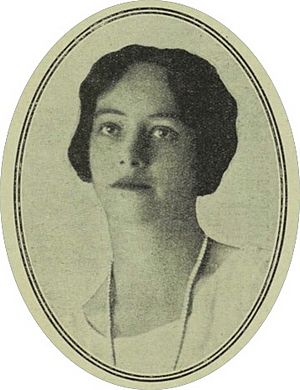Margaret Horder facts for kids
Quick facts for kids
Margaret Horder
|
|
|---|---|

Horder in 1929
|
|
| Born | 12 December 1903 Burwood, New South Wales, Australia
|
| Died | 26 September 1978 (aged 74) |
| Education | Studied with Albert Collins, Julian Ashton, and Smith and Julius (the commercial art studio founded by Sydney Ure Smith and Harry Julius) |
| Alma mater | Redlands, Sydney Church of England Co-educational Grammar School |
| Known for | Children’s book illustrator and Australian Artist |
|
Notable work
|
Illustrated award-winning books by Nan Chauncy, Joan Phipson and Patricia Wrightson |
| Spouse(s) | Arthur Freeman |
Margaret Horder (born December 12, 1903 – died September 26, 1978) was a talented Australian artist. She was especially known for drawing pictures for children's books. Margaret Horder created illustrations for famous authors like Joan Phipson, Patricia Wrightson, and Nan Chauncy.
Contents
Margaret Horder's Early Life and Training
Margaret Horder was born in Burwood, Australia, on December 12, 1903. She was taught at home by special teachers until she was twelve. Then, she went to a school called Redlands.
When she was 16, Margaret left school to study art. She learned from well-known artists like Albert Collins and Julian Ashton. She spent three years with Julian Ashton, learning how to draw, paint with watercolours, and sketch from real life. After that, she worked for two years at Smith and Julius. This was a commercial art studio started by Sydney Ure Smith and Harry Julius.
Starting a Career in Art
Margaret Horder's drawings began to appear in a magazine called The Home in the early 1920s. Later, she was hired by The Sun newspaper and moved to Melbourne.
After working at The Sun, she returned to Sydney. There, she opened her own art studio. She worked alongside Betty Rogers, who had also trained with her. Betty often helped Margaret by posing as a model for her drawings.
First Book Illustrations
Margaret Horder's first book of illustrations was Babber Ballads by W. S. Philbert in 1924. Reviews of the book praised her work. The News newspaper said her illustrations were "the best part of the book." They called her drawings "clever and original." The Sydney Mail also noted that she had a "gifted pencil" and captured the fun of the verses very well.
Travels and Work Abroad
In 1929, Margaret Horder left Sydney to visit her sister in California. She then traveled to Europe. In Holland, she worked on art projects for a company called Philips. Later, she moved to London, England.
During the 1930s in London, Margaret focused on creating posters. She made many posters, especially for the Great Northern Railway Company. She also worked as an illustrator for Oxford University Press and other publishers. She drew pictures for several books by authors like Dorita Fairlie Bruce and Elsie J. Oxenham.
Return to Australia and Later Career
Margaret Horder came back to Australia in 1948 with her husband, Arthur Freeman. He was also an artist. On their ship journey, they met author Dale Collins. He asked Margaret to illustrate his book, The Vanishing Boy.
Margaret Horder became very well-known for illustrating books that won awards. She drew pictures for books by Nan Chauncy, Joan Phipson, and Patricia Wrightson. She also worked for the New South Wales School Magazine from 1958 to 1969, creating art for young readers.
In 1973, Margaret and her husband retired to Palma Majorca. However, they returned to Australia four years later. Margaret Horder passed away on September 26, 1978.
Today, some of her original drawings from 1950 to 1969 are kept at the National Library of Australia.
Books Illustrated by Margaret Horder
Margaret Horder illustrated many books throughout her career. Here are some of her notable works:
- Babber Ballads by W. S. Philbert, 1924
- Six books in Elsie J. Oxenham's Abbey Connectors series, 1940–1950
- Five books in Elsie J. Oxenham's Abbey Series series, 1945–1950
- Six books by Dorita Fairlie Bruce, 1943–1952
- They Found a Cave by Nan Chauncy, 1948
- The Vanishing Boy by Dale Collins, 1949
- Good Luck to the Rider by Joan Phipson, 1953 (This book won an award in 1953)
- The Crooked Snake by Patricia Wrightson, 1955 (This book won an award in 1956)
- Tiger in the Bush by Nan Chauncy, 1957 (This book won an award in 1958)
- It Happened One Summer by Joan Phipson, 1957 (This book was highly praised in 1958)
- The Family Conspiracy by Joan Phipson, 1962 (This book won an award in 1963)
- I Own the Race Course! by Patricia Wrightson, 1968
 | Stephanie Wilson |
 | Charles Bolden |
 | Ronald McNair |
 | Frederick D. Gregory |

